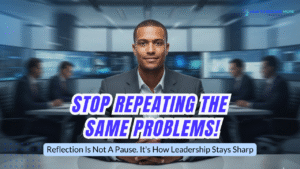There’s a reason leadership is often described as lonely.
At the top, the stakes are higher, the pressure greater, and the room for error—unforgiving. Everyone expects answers from you, but very few are equipped to help you ask the right questions. That’s why the most effective CEOs aren’t just brilliant—they’re well-supported. They think at a higher level because they’ve learned to process at a higher level.
And they don’t do it alone.
The CEOs who consistently lead with clarity, make bold moves, and sustain performance over time have something powerful in common: a strategic sounding board.
You’re Not Supposed to Carry It All Alone

The truth is, the higher you climb, the fewer people can relate to what you’re carrying. Your team may be brilliant, but they’re also looking to you for direction. Your board wants results. Your peers might be competitors.
So where do you go to pressure test your ideas? Where do you unpack the mental load before it becomes a leadership liability?
A strategic sounding board creates the space to do just that. It’s not coaching in the traditional sense. It’s not mentorship. It’s a confidential, high-level conversation with someone who gets it—someone who sees the whole board and helps you see beyond your current thinking.
They bring perspective, clarity, and truth—often the kind that challenges your default patterns and expands your leadership.
Thinking Alone Is the Fastest Way to Slow Down

Many CEOs believe they need to have all the answers. But the best ones realize that growth doesn’t come from having all the answers—it comes from asking better questions.
Without that kind of dialogue, it’s easy to slip into reactive leadership. You start relying on gut instinct for everything, making decisions in isolation, and missing the opportunity to align your choices with the bigger vision.
That’s where a sounding board becomes not just helpful, but essential. It gives you the space to slow down, zoom out, and make decisions with greater intention. The real ROI? Fewer regrets, faster execution, and a mindset that’s several moves ahead.
Who Should Be in That Seat Across from You?

Not everyone is qualified to speak into your business—or your leadership. The person sitting across from you in this role needs to be more than just experienced. They need to know how to challenge you without ego, offer perspective without an agenda, and listen deeply enough to hear what’s not being said.
A strategic sounding board holds space for both your logic and your vision. They help you get out of the weeds, quiet the noise, and think beyond the immediate to what truly matters next.
This isn’t about outsourcing your decisions. It’s about making them better—because you’ve taken the time to process, reflect, and align.
The Best CEOs Aren’t Lone Wolves—They’re Strategic Thinkers

When you study the top CEOs—the ones who scale fast, lead with purpose, and don’t burn out—you’ll find a common pattern. They have space to think. They build it into their rhythm. And they protect it fiercely.
They know that strategy doesn’t happen in the chaos of back-to-back meetings. It happens in quiet, focused conversations where clarity can rise above the noise.
And often, those conversations aren’t had with a team, but with someone who sits beside them—not behind them—pushing their thinking, helping them see blind spots, and anchoring them in what truly matters.
Final Thought: The Next Level Demands a Different Kind of Thinking
You’ve already proven you can lead. That’s not in question.
But if you’re ready to lead with more clarity, make decisions with more conviction, and operate at the level you know you’re capable of—then it’s time to stop thinking alone.
The next level won’t come from more hustle. It comes from more intention.
More clarity. More space to breathe, think, and decide.
That’s what a strategic sounding board unlocks. And if you’re ready for that…
Frequently Asked Questions (FAQs)
1. What is a strategic sounding board for CEOs?
A strategic sounding board is a trusted advisor who helps CEOs think through complex challenges, process big decisions, and elevate their leadership by offering clear, unbiased, and experienced perspective.
2. How is this different from executive coaching?
Coaching often focuses on developing skills or behavior. A sounding board offers high-level strategic dialogue—a place to reflect, challenge, and evolve your thinking in real time.
3. When should a CEO seek out a sounding board?
When decisions feel heavy, when clarity is lacking, or when the pace of leadership starts to outstrip your ability to think clearly—it’s time. Don’t wait for a crisis to build your support system.
4. Is it only for CEOs in crisis or transition?
Not at all. The best time to use a sounding board is before you’re stuck—when you want to maintain momentum, make sharper decisions, and lead with more presence and impact.
5. How often should these conversations happen?
That depends on your pace and preference. For some, monthly is enough. For others, it’s a weekly rhythm. What matters is having consistent, intentional space to pause, think, and lead from strength.
Click Here To Watch The Video
Ready to start your confidential conversation? Reach out to me today, and let’s uncover the leader you’re destined to be.






